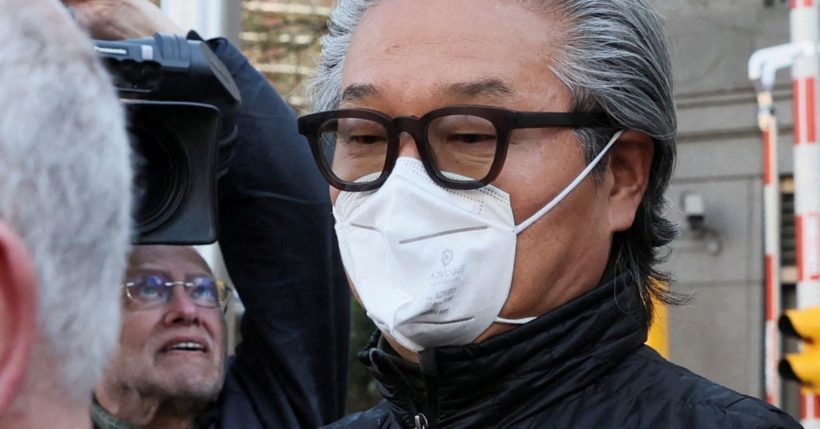
WASHINGTON, April 28 (Reuters) – Bill Hwang spent 25 years building his career, but his downfall took just four days.
The now-notorious owner of Archegos Capital Management took extraordinary risks by leveraging stock positions and artificially inflating their prices, prosecutors alleged on Wednesday. When the private fund ran out of borrowed money a year ago, it imploded and left global banks with losses of $10 billion.
“Over the course of less than a week in late March 2021, the house of cards collapsed,” the Securities and Exchange Commission said in a complaint against Hwang.
Hwang was arrested early on Wednesday and was hit with 11 criminal charges including racketeering, market manipulation and fraud.
Wearing a green turtleneck and beige slacks, Hwang later pleaded not guilty in a Manhattan court and was released on a $100 million bail bond. His lawyer said he was “entirely innocent.” Read full story
It was the second fall from grace for Hwang, who was punished by U.S. and Asian regulators in 2012 for violations at his former hedge fund, Tiger Asia.
Hwang, who has said he is inspired by his Christian faith, later restored his fortunes, revived his Wall Street relationships and had been making big money. Read full story
But in March 2020 he embarked on an aggressive investment strategy that would ultimately destroy everything he had worked to rebuild, according to the indictment.
Operating from his Manhattan apartment as COVID-19 swept New York, Hwang began amassing huge positions in a handful of securities using a derivative known as a total return swap.
In these trades, banks promised Archegos a return based on the performance of a handful of stocks. The strategy allowed Hwang to accumulate leveraged positions in the stocks without owning them and without having to disclose his stakes.
By late March 2021, Archegos had positions exceeding $10 billion in Baidu Inc 9888.HK and Tencent Music Entertainment Group TME.N and more than $20 billion in ViacomCBS Inc VIAC.O. Archegos derivatives’ position was equal to more than 50% of ViacomCBS.
The fund used as many as nine banks, making it appear that different parties were behind the activity. This allowed Archegos to accumulate leverage of as much as 1,000%.
When asked by banks about Archegos’ positions with other dealers, the fund misled them, obscuring its true exposure and enabling it to borrow and trade more, prosecutors said.
Viacom “held up pretty well today…Would you say that is a sign of strength?,” one analyst texted Hwang after he had loaded up on shares to avert a major sell-off. “No. It is a sign of me buying,” he replied.
COMEBACK KID?
The son of a Korean pastor, Hwang moved to the United States as a child and earned several U.S. business degrees.
He honed his stock-picking skills from 1996 to 2000 at Tiger Management, billionaire Julian Robertson’s pioneering hedge fund. In 2001, Hwang launched his own hedge fund business, Tiger Asia Management, with seed money from Robertson.
Tiger Asia grew quickly to more than $8 billion in assets after generating a dazzling 40% annualized return, according to a 2011 Institutional Investor article.
But losses and regulatory issues in Hong Kong and the United States led the firm to shut in 2012. Hwang pleaded guilty to wire fraud related to illegal trading of Chinese stocks and paid $44 million to settle U.S. insider trading charges.
Hwang turned Tiger Asia into a family office, renaming it Archegos Capital Management in early 2013. Wall Street banks were initially wary of Hwang due to his regulatory issues, but eventually Japan’s Nomura gave him a second chance. Read full story
CARDS COLLAPSE
On March 22, 2021 Hwang’s house of cards started to teeter. Viacom CBS announced a secondary stock offering that day, and its share price sank the next day, dragging down the value of Archegos’ portfolio.
Hwang mounted a massive offensive to boost Viacom, attempting to overpower the deteriorating market, according to the indictment. The $2 billion in trading consumed Archegos’ cash and it would not be able to meet its margin calls if the offensive failed.
But Viacom continued to fall.
Over the next two days, Hwang and his team scrambled to stall the banks from calling in their margin loans, prosecutors said. But on March 26, Hwang ran out of time. The banks began unwinding the trades, sending the shares tumbling.
“The bubble burst,” said U.S. Attorney Damian Williams. “The prices dropped. And when they did, billions of dollars of capital evaporated nearly overnight.”
(Additional reporting by John McCrank, Cohen Luc, Lawrence Delevingne; editing by Megan Davies and Cynthia Osterman)

